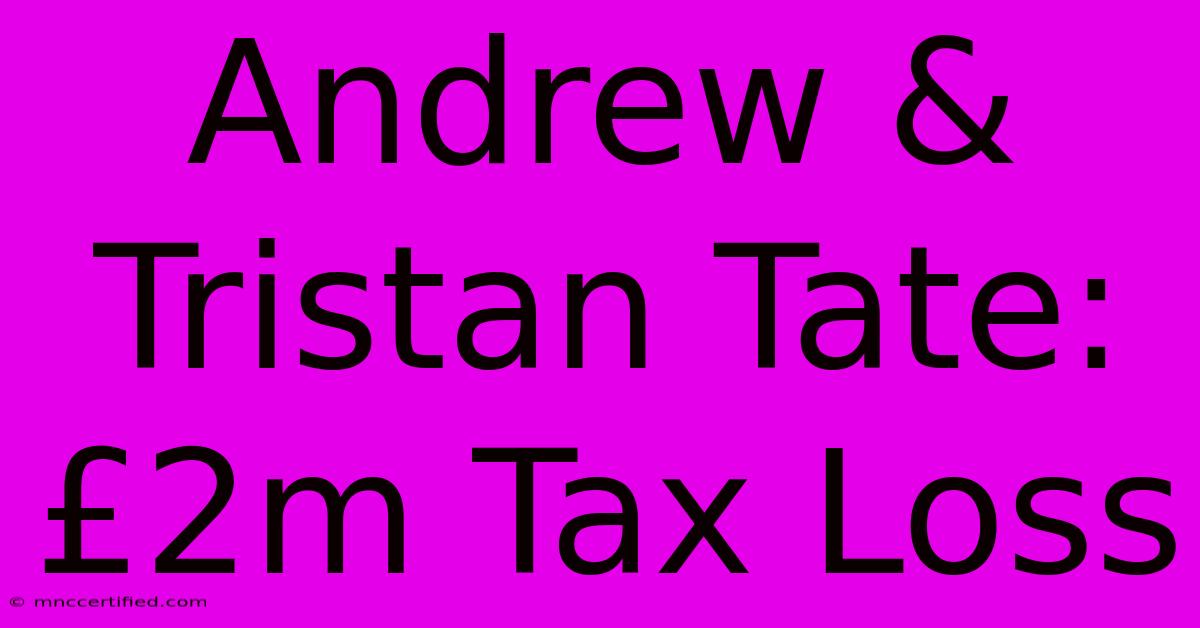Andrew & Tristan Tate: £2m Tax Loss

Table of Contents
Andrew & Tristan Tate: £2m Tax Loss – A Deep Dive into the Controversy
The Tate brothers, Andrew and Tristan, have found themselves embroiled in yet another controversy, this time concerning a reported £2m tax loss. This article delves into the details of this significant financial setback, exploring its potential implications and connecting it to their broader public image and ongoing legal battles.
The £2m Tax Loss: Facts and Figures
Reports indicate that Andrew and Tristan Tate incurred a substantial tax loss of approximately £2 million. While the precise details remain somewhat opaque, the loss reportedly stems from various business ventures and investments, highlighting the complexities and inherent risks associated with their high-profile, often controversial, business dealings. The exact nature of these ventures and the specifics of the tax loss are yet to be fully disclosed publicly. This lack of transparency fuels speculation and further complicates the situation.
Understanding the Implications
A £2m tax loss is a considerable financial blow, particularly given the Tate brothers' already complex financial situation. It raises questions about their financial management practices and potentially highlights vulnerabilities within their business empire. This loss could impact their future investment strategies and could even have legal repercussions depending on the circumstances surrounding the loss. It's crucial to remember that a tax loss isn't necessarily illegal; however, it opens the door to scrutiny regarding their accounting practices and tax compliance.
Connecting the Tax Loss to the Broader Narrative
This recent tax loss is just another chapter in the ongoing saga surrounding Andrew and Tristan Tate. Their controversial public image, fueled by accusations of misogyny and alleged involvement in other legal battles, casts a long shadow over this financial setback. The public's perception of the brothers already leans towards skepticism, and this news only serves to reinforce those preconceived notions.
Public Perception and Media Coverage
The media's coverage of the Tate brothers is often sensationalized, focusing on the more controversial aspects of their lives and business ventures. This tax loss, therefore, fits neatly into a pre-existing narrative of financial instability and questionable ethical practices. The coverage often lacks nuance, potentially fueling public outrage and overshadowing any legitimate explanations for the financial loss. This highlights the challenges of navigating public opinion when operating in the spotlight.
Legal and Financial Ramifications
The £2m tax loss raises several legal and financial questions. Did the loss result from mismanagement, fraudulent activity, or simply poor investment choices? Tax authorities may investigate the circumstances surrounding the loss, leading to potential penalties or further legal action. The long-term financial implications for the Tate brothers are significant and could potentially impact their future business ventures and personal wealth. The lack of transparent information only exacerbates the uncertainty surrounding the situation.
Conclusion: Uncertainty and Ongoing Scrutiny
The Andrew and Tristan Tate £2m tax loss remains a developing story, clouded by a lack of publicly available information and fueled by the brothers' already controversial public profile. The implications are far-reaching, impacting their financial stability, public image, and potential legal exposure. As more details emerge, it will be crucial to approach the situation with a balanced perspective, considering both the financial realities and the broader narrative surrounding the Tate brothers. Further investigation and transparency are needed to fully understand the circumstances and consequences of this significant tax loss.

Thank you for visiting our website wich cover about Andrew & Tristan Tate: £2m Tax Loss. We hope the information provided has been useful to you. Feel free to contact us if you have any questions or need further assistance. See you next time and dont miss to bookmark.
Featured Posts
-
Upcoming Mega Millions Drawing Jackpot Update
Dec 19, 2024
-
Damian Lillard Signs Adidas Deal
Dec 19, 2024
-
Wallaces Master Chef Replacement Announced
Dec 19, 2024
-
The Simpsons Channel 4 Departure 2025
Dec 19, 2024
-
Cara Delevingne As Elton John
Dec 19, 2024